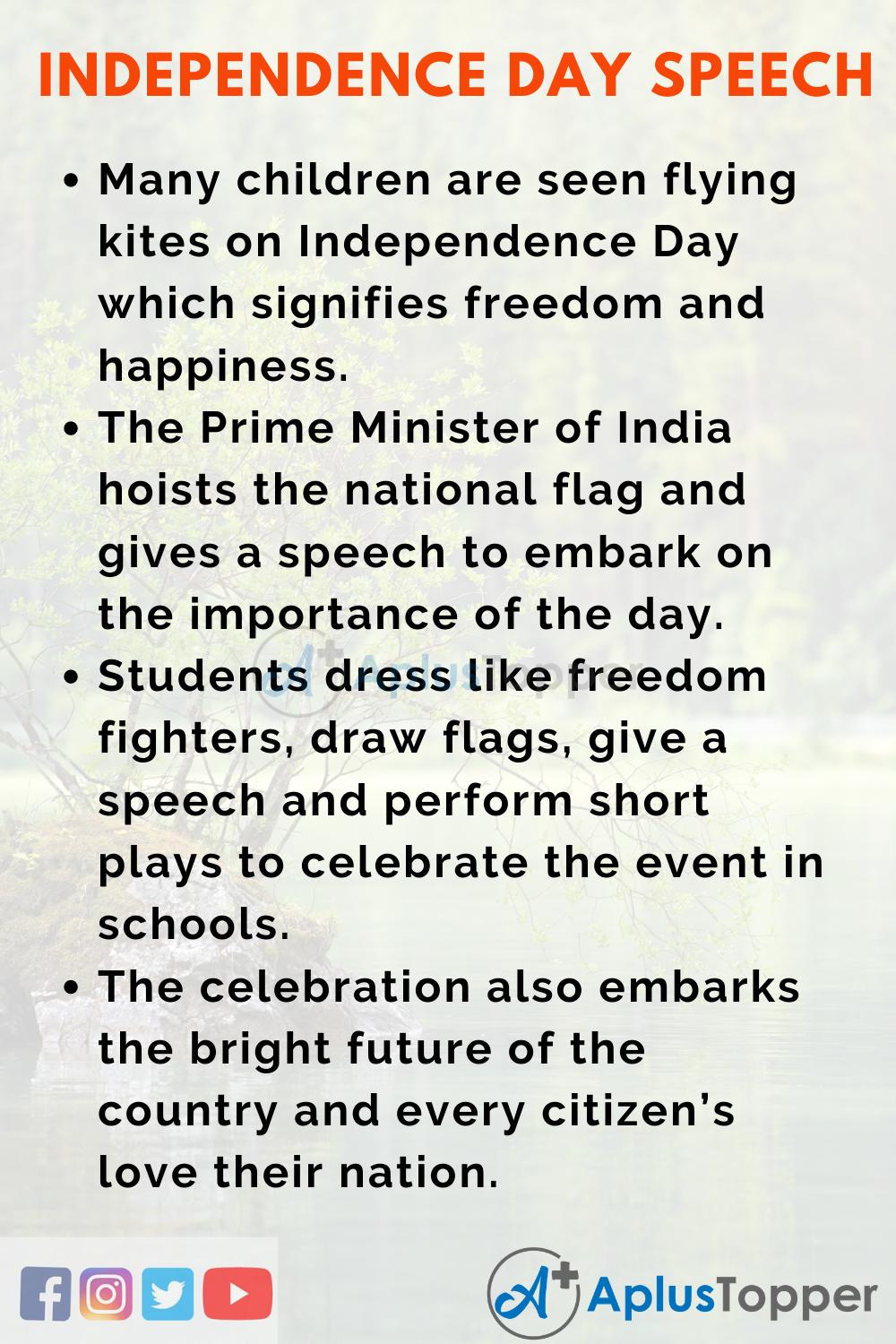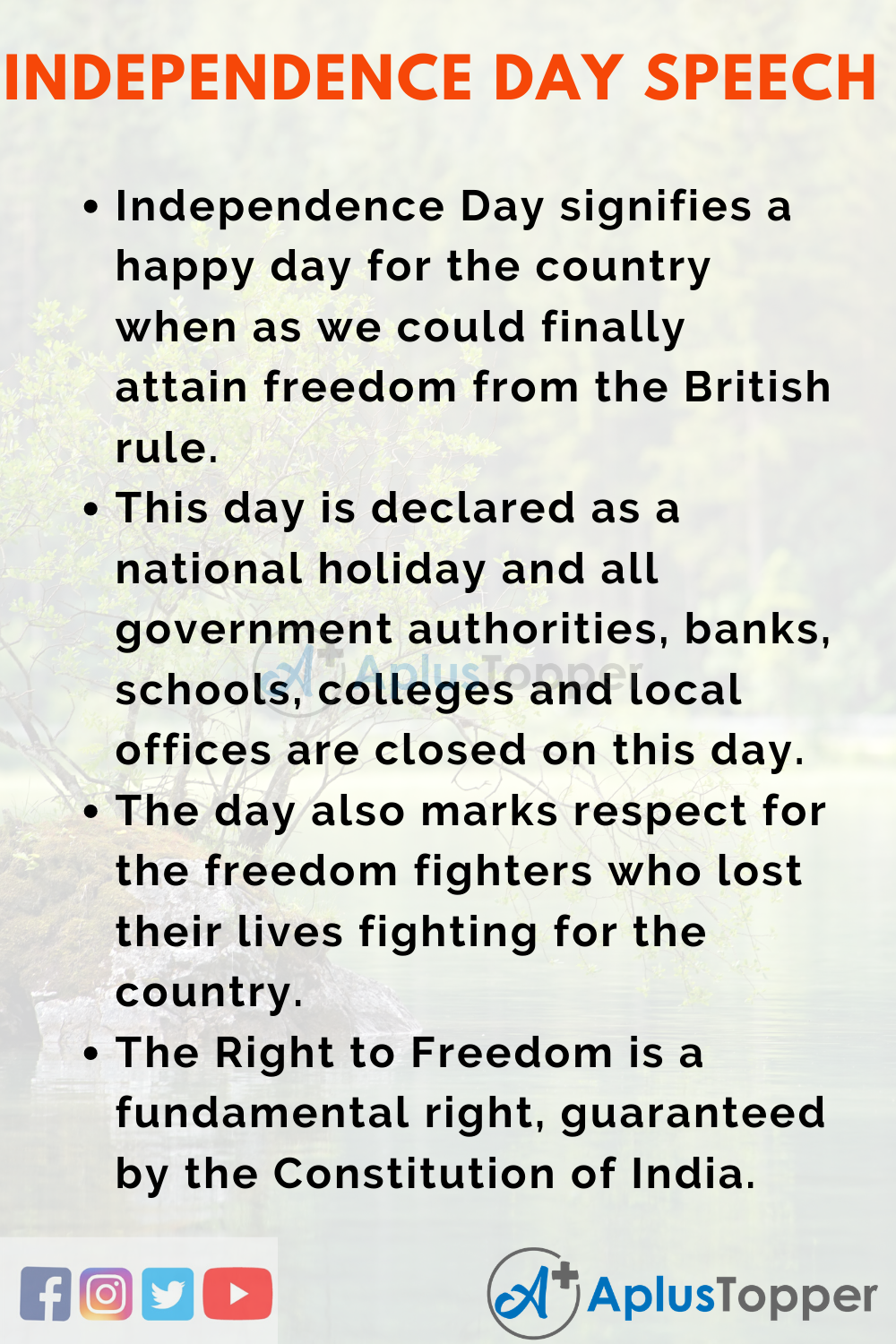Independence Day Speech for Teachers: Independence day is an Indian national festival that brings zealous determinations, affirmations, and positivity amongst all of us. The same feeling of patriotism increases when we share it with our students, as these are our future leaders. As a student, one must also be prepared to deliver a good speech. As you are the one representing your future responsibilities through words. To always ace and leave a great impact on your independence day speech for Kids in English for teachers, you must be prepared with an interesting audience gripping speech. Soonly we will Update Independence Day Speech in Malayalam, Hindi, Telugu.
Students can also find more English Speech Writing about Welcome Speeches, Farewell Speeches, etc
Long and Short Speeches on Independence Day for Teachers
India got independence in 1947, which was 73 years ago. In these years we have already seen a lot of great speeches. But you should try something new, below we have two speeches, both short and long, consisting of 300 and 500 words simultaneously. You can bring up to leave a great impact amongst your fellow students and respected teachers. Short Speech on Independence Day for Teachers is helpful for students of classes 1,2,3,4,5 and 6. Long Speech on Independence Day for Teachers is helpful for students of classes 7,8,9 and 10. A Paragraph on Independence Day is helpful for students to write paragraph writing.
Short Speech on Independence Day for Teachers
Happy independence day and heartily good morning to my dear patriots.
“One individual may die for an idea; but that idea will, after his death incarnate itself in a thousand lives.”
This quote by Netaji means that we are the human incarnation of the ideas that our ancestors have thought of. We must strive harder every day of our life for a better India, that is prosperous and equal to all its citizens.
Independence day is a festival when we celebrate our martyrs and their struggles of a long span of 200 years. India was a British colony for 2 centuries. In this period, the nation underwent a lot of events which made our freedom fighters anxious for a better future. That we are witnessing today. The events being, the massacre at Jalianwala Bagh, the faulty land settlement systems only benefiting the Crown, racial discrimination, and endless such plights. We have come so far that we have started taking it for granted, forgetting the true meaning of the day.
This day shan’t be just a day when we gather to raise the flag and eat sweets. One must keep in mind that the flag that we raise is our head, that we shall never let anyone down. The flag is also the heads that were beheaded in the time stretch. We shall not let them down either. No bite of the delicious sweet should be taken without thinking of those nights when our leaders fought empty stomachs. Us as citizens of this country should always keep the past, present and future glory alive in every moment of this day. We shall promise to keep the head of our farmers, soldiers, doctors, industrialists, and government bodies high. And we shall promise this till perpetuity.
Thank you!
Jai Hind

Long Speech on Independence Day for Teachers
Happy independence to everyone who has gathered here to celebrate this auspicious festival of independent India. I am thankful for having your attention and with this, I would like to begin my speech.
I am here to speak about the importance of this very day. Like every Indian knows we got independence in 1947 on the 15th of August but not many know it’s importance. As an independent citizen of the Republic of India, I would like to throw some light on the issue that is important to be addressed in the beaming light of our independence under the roof of our Tiranga.
The British raj had made the lives of natives of the subcontinent dreadful. The developments that took place under them were in no sense beneficial to a common peasant. A peasant was the backbone of the economy, as the state was encompassed with agricultural activities. There was a lot of racial discrimination. Many more graver issues like these garnered a feeling of nationalism. This was a great start on a land where people were losing the battle against the unjust.
The independence that we are taking for granted never came to us served on a plate. As time passed the nationalist feelings amongst us also strengthened. Our glorious past made us realize our worth. At this moment there was a strong uprising against the Raj. The economic drain due to commercial plantation and replacement of Indian handicrafts with machines resulted in a nation that was finally awakening. These agitations helped India recoup some say in the government doing.
Also, the censorship from the vernacular press introduction of local self-government slowly made it into the milieu. In 1892 India reached a great millstone with Indian Council Acts which increased the political level of the INC. We swiftly moved towards something great when India finally was breaking the British Raj by hailing satyagraha, swadeshi boycotts, strikes, and mass non-cooperation movement.
With all these events Mahatma Gandhi became a household name in whom people’s faith was residing. And these events made the Indian congress unfurl the Tiranga on the 26th of January 1930 when India celebrated its first independence, called Purna Swaraj. In 1947 India reached a final negotiation and the transfer of authority was finally shifting from the crown to the Indian subcontinent. It has been a long journey and we turned our lowest points into our strength by learning from that period.
India has seen the worst. Now it is our duty to make our motherland proud. This can be achieved only if we are honest towards our duties and respect everyone. Let us absorb what Gandhi Ji said:
“Freedom is never dear at any price. It is the breath of life. What would a man not pay for living?”
I am thankful to my teachers to not just teach us the lesson about Indian independence but also teach us patriotism and love for the nation. I have also learned that as responsible citizens, we all must respect our past. Instead of shifting blames in the wake of hatred we should instead learn to fight against the odds. With this, I will give pause to my words and would want to leave you with a question. Are we all justly serving our nation? India of our dreams should be reaching the heights of honor. Every citizen of India deserves a prosperous life, and we through education can help the nation sprung in all its glory.
Thank you!
Long live the revolution
Jai Hind!
10 Lines on Independence Day Speech for Teachers
10 Lines on Independence Day are as follows:
- Independence Day signifies a happy day for the country when as we could finally attain freedom from the British rule.
- This day is declared as a national holiday and all government authorities, banks, schools, colleges and local offices are closed on this day.
- The day also marks respect for the freedom fighters who lost their lives fighting for the country.
- Many children are seen flying kites on Independence Day which signifies freedom and happiness.
- Students dress like freedom fighters, draw flags, give a speech and perform short plays to celebrate the event in schools.
- The Prime Minister of India hoists the national flag and gives a speech to embark on the importance of the day.
- The celebration also embarks the bright future of the country and every citizen’s love their nation.
- Independence Day holds great importance as it allows the citizens of India to cherish their right to freedom.
- The Right to Freedom is a fundamental right, guaranteed by the Constitution of India.
- A person has the right to speech and expression, follow any religion, live a life of dignity, form associations and carry any legal profession or occupation under this act.

FAQ’s on Independence Day Speech for Teachers
Question 1.
Why do we celebrate Independence Day?
Answer:
Independence day marks the shifting of administrational power from the crown to the natives of India.
Question 2.
When did India gain independence?
Answer:
India officially became independent on 15th August 1947. However, 26th January 1930 was unofficially observed as the day when the nation got Purna Swaraj. This day is now observed as Republic day in India.
Question 3.
Who wrote the national anthem?
Answer:
Rabindranath Tagore.
Question 4.
Who has a major contribution to Indian independence?
Answer:
Mahatma Gandhi was the leader of many revolts against the British raj. He is also known as the father of the nation. Apart from that Bhagat Singh, Chandra Shekhar Azad, Nana Sahib, Lal Bahadur Shastri and Subhash Chandra Bose are some brave and popular Indian freedom fighters who helped the nation gain Independence.
